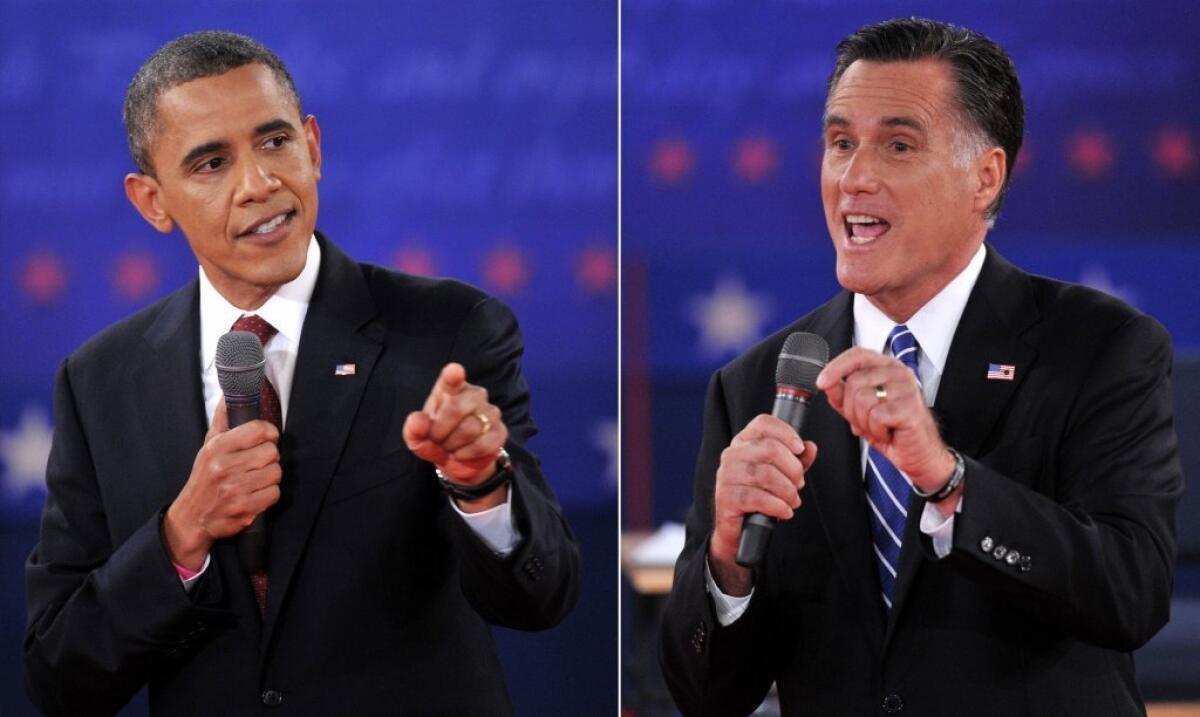McManus: The perils of political punditry

- Share via
Back in 2011, at the dawn of a long presidential campaign, I established a fine baseline for my credentials as a political prognosticator: I told readers that Mitt Romney’s strongest challengers for the Republican nomination would be Texas Gov. Rick Perry and former Minnesota Gov. Tim Pawlenty.
Neither one has been heard from since.
Could I top that record in 2012?
SLIDESHOW: Best and worst outcomes from the 2012 election
Pretty close. Last spring, I announced in a column that Sen. Rob Portman of Ohio would be Romney’s running mate. Sure, I hedged a little, saying the choice was “almost certain.”
But, hey, Portman seemed perfect: a bland, budget-savvy conservative from the most important swing state.
Yes, I noted, Romney seemed to like Rep. Paul Ryan of Wisconsin. But it didn’t seem possible to me that he’d take the risk of embracing Ryan’s proposal to turn Medicare into a voucher plan.
The smart money was on Portman, I wrote. That was true. But the smart money and I were wrong.
That was only one of several bad calls, blind alleys and blunders that I lavished on readers in the course of 2012, an election year with a lot of surprises.
My biggest wrong turn, in retrospect, was a theme I sounded several times during the campaign: the presidential election was certain to be close.
Not just close, but “razor close … and headed toward an unpredictable finish,” I wrote in October, after President Obama’s lackluster performance in his initial debate with Romney.
Only it wasn’t close. When the dust settled, Obama defeated Romney soundly, winning 51% of the popular vote and all but one of the swing states.
Heck, it wasn’t even unpredictable. As political junkies know, several people, including statistician Nate Silver of the New York Times and political scientist Simon Jackman of Stanford University, called the outcome down to the last electoral vote.
What happened?
Simple: Obama voters, especially Latinos and young people, turned out in greater numbers than most forecasters expected. Romney voters didn’t.
To quote Romney’s pollster, Neil Newhouse, who thought his candidate was going to win: “We saw, in the last two weeks, an intensity advantage” — but it turned out to be a mirage. “The real hidden story [was] the number of white men who didn’t vote.”
My only consolation is that I wasn’t as wrong as Newhouse or his Republican colleague Karl Rove, who predicted that Romney would win by a comfortable margin.
On the eve of the election, I wrote that Obama had a clear advantage in the swing states, making his electoral-vote victory almost certain. But the popular vote, I warned, was still “too close to call.”
Instead, Obama won the popular vote by almost 4 percentage points and became the first Democrat since Franklin D. Roosevelt to win more than 50% in consecutive elections.
Beyond the perils of horse-race punditry, the scale of Obama’s victory was significant for several reasons. It demonstrated that the demographic transformation of the American electorate has occurred more quickly than expected, which means the GOP has a permanent problem if it continues to depend on aging white voters. And as my colleague Ron Brownstein pointed out, the Democratic coalition that reelected Obama was solidly in favor of liberal positions on taxes, immigration and gay marriage, giving the president an unusually united electoral base as he pushes for agenda items such as immigration reform.
Did I get anything right? Sure. I forecast early and often that Romney would survive challenges from that dizzying chorus line of primary opponents, from Michele Bachmann to Newt Gingrich and Rick Santorum. I argued that Romney would run as a conservative, not as a moderate, despite an aide’s prescription that he change like an Etch A Sketch; that turned out to be mostly true. And in a minor feat of clairvoyance, I wrote on the eve of the first Obama-Romney debate that incumbent presidents often stumble in those contests. Obama walked straight into the historical trap; like earlier presidents, he thought he had more important things to do than prepare for a debate. Wrong!
On some predictions, the jury is still out. I wrote that an election that returned a Republican House and a Democratic Senate would guarantee two more years of gridlock; I hope I was wrong about that. After the movie theater shooting in Aurora, Colo., in July, I wrote that the debate on gun control was long over and the National Rifle Assn. had won; public revulsion at the murder of 20 schoolchildren in Newtown, Conn., will put that crabbed diagnosis to the test.
And only a few weeks ago, I peered over the edge of the “fiscal cliff” — and assured worried readers that it wasn’t as bad as it looked.
“It’s not really a cliff,” I wrote. “It’s merely a steep, scary slope…. If Congress fails to make a deal by Christmas, that doesn’t mean the economy automatically tips into a recession.”
I was correct on the first half of that prediction — that a “grand bargain” on taxes and spending wouldn’t happen by the end of the year. As for the second half — that the economy wouldn’t be too badly hurt as a result — I only hope I got that one right too.
Follow Doyle McManus on Twitter @DoyleMcManus
More to Read
Get the L.A. Times Politics newsletter
Deeply reported insights into legislation, politics and policy from Sacramento, Washington and beyond. In your inbox three times per week.
You may occasionally receive promotional content from the Los Angeles Times.











